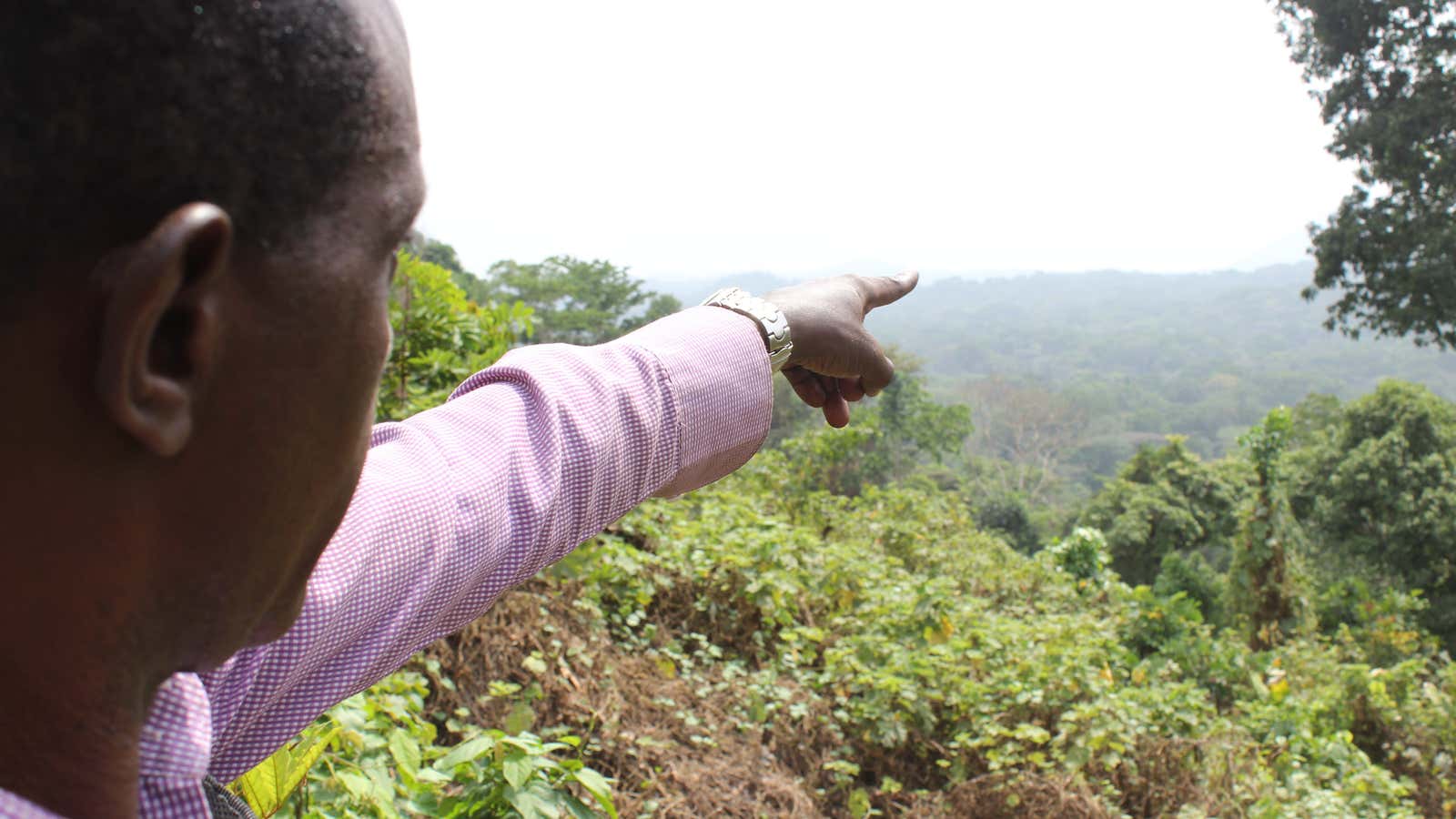Almost anyone who visits Nigeria as a tourist or for business will soon realize that, after years of neglect, the country is in dire need of significant transportation and road infrastructure upgrades to help open up Africa’s largest economy.
Yet, despite the poor road network, a proposed transformative superhighway for Cross River state, in the southeast of the country (often referred to as “South-South”), is struggling to win supporters. The reason? Activists claim the proposed highway will have severe negative environmental impact and will likely displace up to a million people.
Just last week, a small group of activists were in Abuja to present Nigeria’s president Buhari with over 253,000 signatures collected from the affected forest-dependent communities of Cross River and other international supporters. They’re calling for the immediate de-revocation of the traditional rights of occupancy of all the affected by proposed highway and for a re-routing of the project all together.
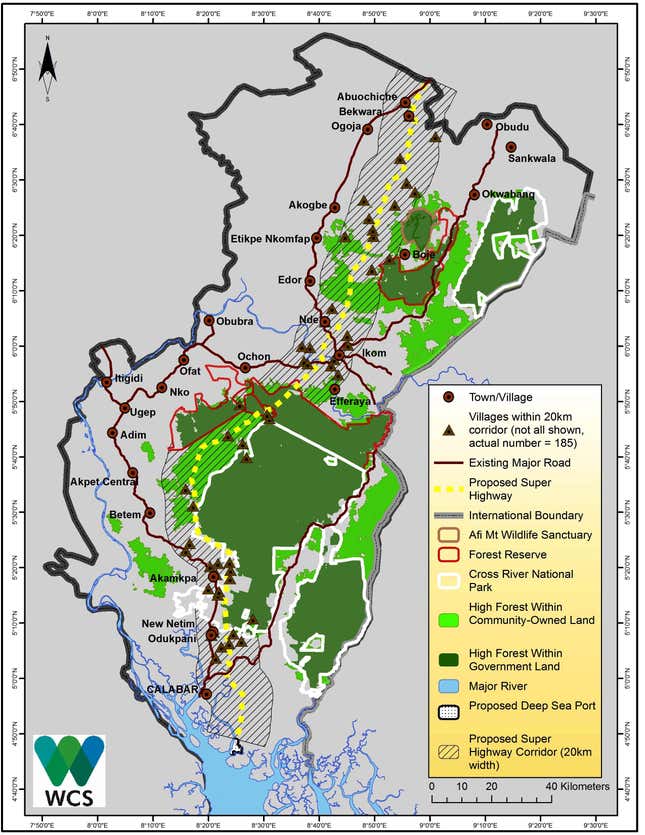
Government officials have countered that the superhighway will open a new economic corridor and create thousands of jobs while also improving access to areas of the state that are underserved by roads. Tourism, for example, could get a significant boost if the new highway makes it easier for visitors to reach the region, these officials have said.
The superhighway is planned to be a 12-lane, 260 km (162 miles) long with Wi-Fi internet connectivity which will link a proposed deep seaport from Bakassi on the shores of the Atlantic Ocean to the border with neighboring Benue state. The Cross River state governor, Ben Ayade hopes that other Nigerian state governments will continue the superhighway within their domains until it reaches Nigeria’s northernmost border with Chad.
However, the project has drawn protests from local activists and 15 international organizations, including the World Wildlife Fund (WWF), the World Conservation Society and Birdlife International. They say if the project is carried out, up to 180 communities will lose their lands and homes, as the superhighway will pass through their local areas. Conversationists believe the proposed highway will lead to the loss of a large portion of the last remaining rainforests in Nigeria, half of which are in Cross River state.
“The project seeks to acquire 20.4km of land all along the superhighway as right-of-way without consultation from the communities,” said Martins Egot, who runs Ekuri Initiative, a community-based initiative. “Taken altogether, this project will take a quarter of the land in the state. It is a pure land grab – why ask for 20km as right-of-way when the right-of-way for federal expressways in Nigeria is 50 metres?” asks Egot, whose organization manages the Ekuri Forest, which lies along the route of the project.
Ayade has pushed back at suggestions the new highway will have significant environmental impact.
Rainforests in the state have large portions of it designated as protected areas such as the Cross River National Park , Cross River South Forest Reserve, the Afi River Forest Reserve and the Afi Mountain Wildlife Sanctuary—all of which the activists say lie within the right-of-way of or very close to the superhighway.
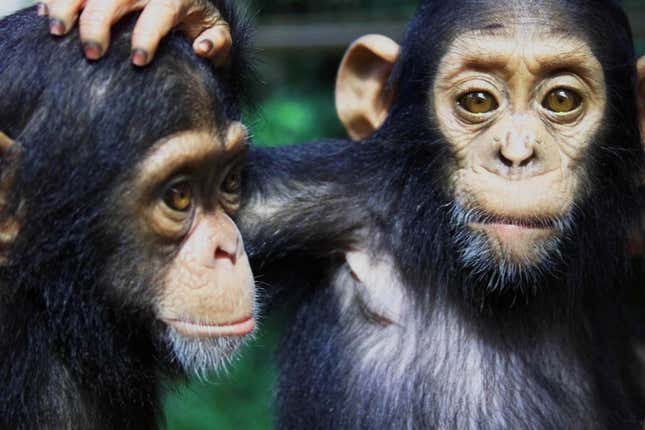
These protected areas are very rich biodiversity hotspots and home to endangered animal and plant species: for example, 16 primate species have been recorded in the Cross River National Park, including common chimpanzees, drills, Cross River gorillas and the gray-cheeked mangabey, already considered extinct in the area. Altogether, 78% of the primate species in Nigeria are found within the park’s area. It also contains about 950 species of butterflies, 610 species of birds (including vulnerable species such as the gray parrot and unusual species such as the olive long-tailed cuckoo and the grey-throated tit-flycatcher) and 42 species of snakes.
The highway, which was okayed 13 months ago by president Muhammadu Buhari, is joined by a proposed seaport as the signature projects of governor Ayade, But a few months later the state government of Ayade and the federal government of Buhari find themselves on a collision course as push back mounts. It’s because the commencement of the clearing of rainforests began before the completion and approval of an Environmental Impact Assessment (EIA) for the project.
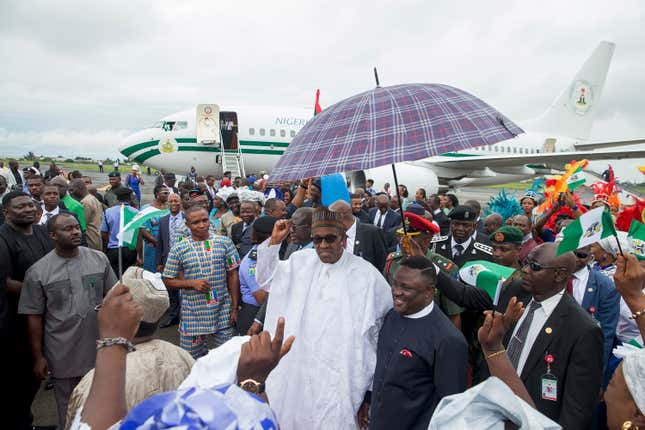
The clearing of the rainforest caused numerous local and international environmentalists to petition the minister of environment, Amina Mohammed, to invoke the EIA Act, a federal law that mandates a study on the likely effects of environmentally sensitive projects before they start, to stop the project. The minister,who used to be a special adviser to the United Nations secretary-general, obliged, issuing a stop-work order in March pending the conclusion of the EIA process.
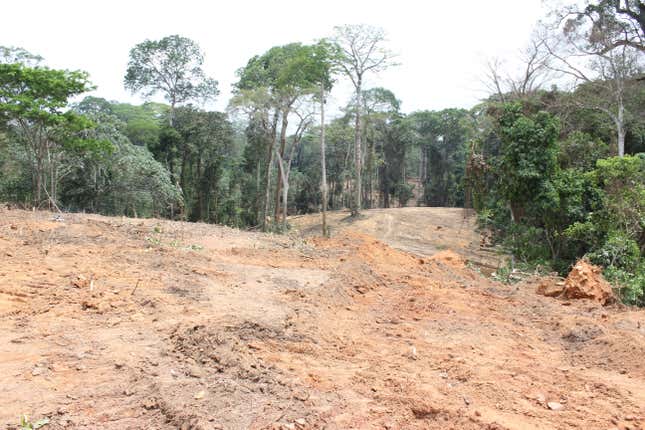
However, the draft EIA report failed to account for the 20km right-of-way and could not provide financial justifications to show how it will be funded, earning it a ‘D’ grade from the Federal Ministry of Environment, which means that it needs to be redone in parts.
In the meantime, communities are mobilizing and creating awareness amongst themselves to oppose the project. Egot of Ekuri Initiative and chief Edwin Ogar, who also runs an environmental organization, Wise Administration of Terrestrial Environment and Resources (WATER), were able to mobilize the Ekuri community to protest against the clearing of their forest, forcing the bulldozers that had arrived to leave.
Another activist, Mr. Odey Oyama of Rainforest Resource and Development Centre, a Calabar-based environment organization, that is also involved in community mobilization says that there is no known plan on how to resettle the approximately one million people who are being displaced from their lands for this project.
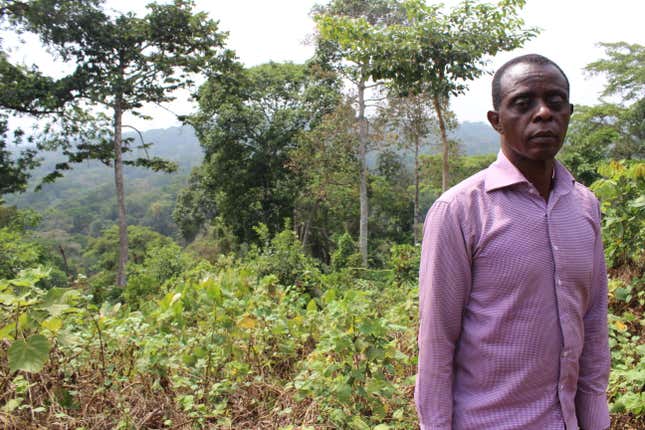
“The acquisition notice is for 180 communities [spread] over 5,200 square kilometers of land. How will these 1 million people benefit from the project after they have been forced to migrate?” Oyama asked.
There has been an increase in environmental awareness in Nigeria as a whole, and in the Niger-Delta region in particular, where Cross River state is situated. That increase in awareness and sensitivities comes after coping for decades with pollution from oil exploration and production. Although Cross River state has largely been immune from oil pollution, there is a still an active coalition of environmental-based civil society organizations in the state. Together with past state administrations, they have worked to protect the rainforests, nature parks and protected areas and use it to drive tourism.
Cross River was selected by the United Nations-Reducing Emissions from Deforestation and Forest Degradation (UN-REDD+) program where communities earn international carbon credits for protecting trees as one of the pilot states in Africa. This program earns the state an estimated $4 million yearly.
Odigha Odigha, is a frontline environmental activist whose work at his NGO, the Coalition for the Environment, won him the Goldman Prize (nicknamed the Green Nobel Prize) in 2008 for his efforts to protect the rainforest before he ran the Cross River Forestry Commission. Odigha’s efforts were instrumental in the setting up of the UN-REDD+ program, and he says the superhighway project will negatively impact on the UN-REDD+ program by cutting down the rainforests.
“The superhighway completely undermines the REDD+ program which is intended to launch Cross River State and Nigeria on the path to a green economy/ new carbon economy,” Odigha said.
To date, key Cross River state officials have declined to comment on the controversy when contacted by Quartz. The commissioner for climate change, Alice Ekwu; the commissioner for works, Mike Eraye and the director of lands and conflict, John Ada did not answer Quartz’s calls, return text messages or respond to email queries.
In the meantime, the communities are awaiting the fate of their land and homes as the state government goes back to redo the EIA as demanded by the federal authorities.
All the power lies in the hands of the Environment Minister.
